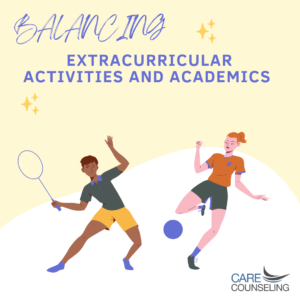Balancing Extracurricular Activities and Academic Success
 Extracurricular activities play a vital role in a student’s overall development, fostering skills such as teamwork, leadership, and time management. However, striking the right balance between extracurricular commitments and academic success can be a challenging task for students, parents, and educators. Engaging in too many activities can lead to burnout and negatively impact academic performance, while too few activities may hinder personal growth and social development.
Extracurricular activities play a vital role in a student’s overall development, fostering skills such as teamwork, leadership, and time management. However, striking the right balance between extracurricular commitments and academic success can be a challenging task for students, parents, and educators. Engaging in too many activities can lead to burnout and negatively impact academic performance, while too few activities may hinder personal growth and social development.
The Benefits of Extracurricular Activities:
Participating in extracurricular activities can enrich a student’s life in various ways:
- Skill Development: Extracurricular activities offer opportunities to develop leadership, communication, and time management skills that may not be fully addressed in the classroom.
- Personal Growth: Exploring diverse interests and passions can help students discover their talents and build self-confidence.
- Social Interaction: Engaging in extracurricular activities provides opportunities to form meaningful friendships and develop social skills.
- College Applications: Many colleges and universities value a well-rounded student with a mix of academic achievements and extracurricular involvement.
The Pitfalls of Overcommitment:
While extracurricular activities offer numerous benefits, overcommitment can lead to adverse effects, including:
- Academic Stress: Balancing a heavy extracurricular load with academic responsibilities can lead to increased stress and diminished academic performance.
- Physical Exhaustion: Lack of sufficient rest and downtime due to excessive activities can result in physical exhaustion and compromised health.
- Reduced Focus: Overcommitment may lead to a lack of focus on both academic and extracurricular pursuits, resulting in a subpar performance in both areas.
Tips for Finding the Right Balance:
- Prioritize Academics:
Academic success should always be the top priority. Encourage your child to allocate sufficient time for homework, studying, and test preparation before committing to extracurricular activities.
- Explore Interests:
Help your child explore various extracurricular activities and identify their true passions. Quality involvement in a few activities is more beneficial than superficial engagement in many.
- Create a Realistic Schedule:
Work with your child to create a manageable schedule that balances academic commitments, extracurricular activities, and downtime. Ensure they have enough time for rest.
- Monitor Time Management:
Teach your child effective time management skills to avoid feeling overwhelmed by their commitments. Encourage them to use tools like calendars and to-do lists to stay organized.
- Set Limits:
Set limits on the number of extracurricular activities your child can participate in simultaneously. Focus on depth of involvement rather than quantity.
- Communicate with Teachers:
Keep lines of communication open with your child’s teachers to stay informed about their academic progress and identify any potential areas of concern.
- Encourage Breaks:
Encourage your child to take breaks between activities and avoid back-to-back commitments. This allows time for relaxation and rejuvenation.
- Reevaluate Regularly:
Regularly reassess your child’s extracurricular commitments to ensure they strike the right balance. Be open to adjustments if necessary.
Balancing extracurricular activities and academic success is essential for a well-rounded educational experience. While participation in extracurricular activities offers numerous benefits, it must be balanced with academic responsibilities to avoid burnout and maintain high academic performance. By prioritizing academics, exploring interests, and setting realistic limits, students can find the right mix that enhances their personal growth, social skills, and overall academic success. As parents and educators, our guidance and support are instrumental in helping students strike this delicate balance and thrive both inside and outside the classroom.



























